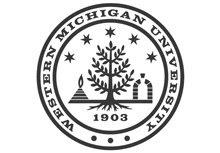Last month, IME professor Dr. Sam Ramrattan hosted a weeklong metal-casting workshop for nine high school students from areas around Detroit, Ann Arbor, and Saginaw, Michigan; Cleveland, Parma, and Defiance, Ohio; and Windsor, Ontario. He has been offering the annual hands-on workshops for up to 15 area tenth-through-twelfth-grade students for the last eight summers.
Dr. Sam Ramrattan (right) and Adil Abdelwahab (second from right in back), an IME graduate student, pose with nine high school students who attended the 2007 summer metal casting short course at WMU
During the students’ five-day campus visit, Ramrattan, a technical advisor to the American Foundrymen's Society and a Key Professor for the Foundry Educational Foundation, directs activities in the College of Engineering and Applied Sciences, Parkview Campus Metal Casting Laboratory.
Workshop topics include metal casting history, trends, and the relationship of manufacturing (molding, melting, filling, and finishing), engineering, quality, purchasing, marketing, and sales of castings. The students explore the use of computers, math, and science in metal casting.
In addition to their lab and course work, the students meet with WMU administrators to discuss university entrance requirements and expectations and with professionals from the foundry industry to review career opportunities in metal casting.
Field trips to metal casting industries provide students with opportunities to see real-world technology and to meet with professionals. This year’s attendees toured Metal Technologies’ Three Rivers Gray Iron Plant, and Contech’s die casting facilities in Dowagiac, MI. They also enjoyed activities in the Kalamazoo / Portage metro area.
Students who attend the program are sponsored by various chapters of the American Foundry Society (AFS) and the North American Die Casting Association (NADCA). Students are selected on the basis of an aptitude for math and science. There is no cost to the students, who stay in WMU dorms and enjoy campus life.
Dr. Sam Ramrattan supervises as two students pour molten aluminum into sand molds that they had prepared. Other high school students, seated behind the protective barrier, took turns donning safety apparel and making their own sand castings.
WMU has had a casting metal program in various engineering curricula since the college opened over 100 years ago. Its most recent accreditation began in 1992 when Ramrattan joined the faculty. It is currently an option in all IME undergraduate programs. “Our goal is to produce hands-on engineers as an integral part of what we do in manufacturing engineering programs,” he said.
Saginaw high school students Steve Trombley (left) and Rollin Carter prepare a sand mold that they will use to create sand castings from molten aluminum.
Ramrattan specializes in material and process improvement emphasizing casting and non-traditional manufacturing processes. For more information, contact him at sam.ramrattan@wmich.edu








